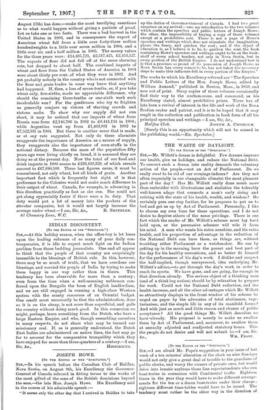THE WASTE OF DAYLIGHT.
rTo THE EDITOR OF THE "SPECTATOR.-1 SIR,—Mr. Willett's dream is delightful. Few dreams improve our health, give us holidays, and reduce the National Debt. To convert such a dream into reality demands the voluntary action of the people,—not an Act of Parliament. Do we really want to be rid of our evenings indoors ? Are they not often (especially in our changeable climate) the most pleasant part of the day ? Has Mr. Willett really done much more than embroider with illustrations and statistics the tolerably well-known adage that connects a man's early rising and retiring with the state of his health, wealth, and wisdom ? He certainly goes one step farther, for he proposes to put us to bed and get us up by Act of Parliament. Personally, I like to choose my own time for these operations, and I do not desire to deprive others of the same privilege. There is one fact which the reader of Mr. Willett's scheme must lay bard hold upon, or the persuasive schemer will wile it front his mind. A man who wants his extra sunshine, and his extra health, and his proportion of advantage in the reduction of the National Debt can have them, as things are, without troubling either Parliament or a watchmaker. He can by getting up in the morning have the purest and best part of the day for his healthy recreations, and so better fit himself for the performance of his day's work. I dislike and suspect the half-implied, though unexpressed, idea underlying Mr. Willett's advice,—to get through the day's work in order to reach its sports. We have gone, and are going, far enough in that direction already. The serious object of a thinking man (and of a think ing nation) should be by relaxation to prepare for work. Could not the National Debt reduction, and the health increase, and all the other advantages which Mr. Willett so attractively displays in the front window of his scheme be urged on paper by the advocates of total abstinence, vege- tarianism, and the simple life in any of its manifold forms ? And with just as much and little reason and chance of public acceptance ? All the good things Mr. Willett describes we have 'already. His proposal is merely to make us swallow them by Act of Parliament, and, moreover, to swallow them at annually adjusted and readjusted statutory hours. This the people do not desire and will not submit to.—I am, Sir,
WM. FROST.






































 Previous page
Previous page